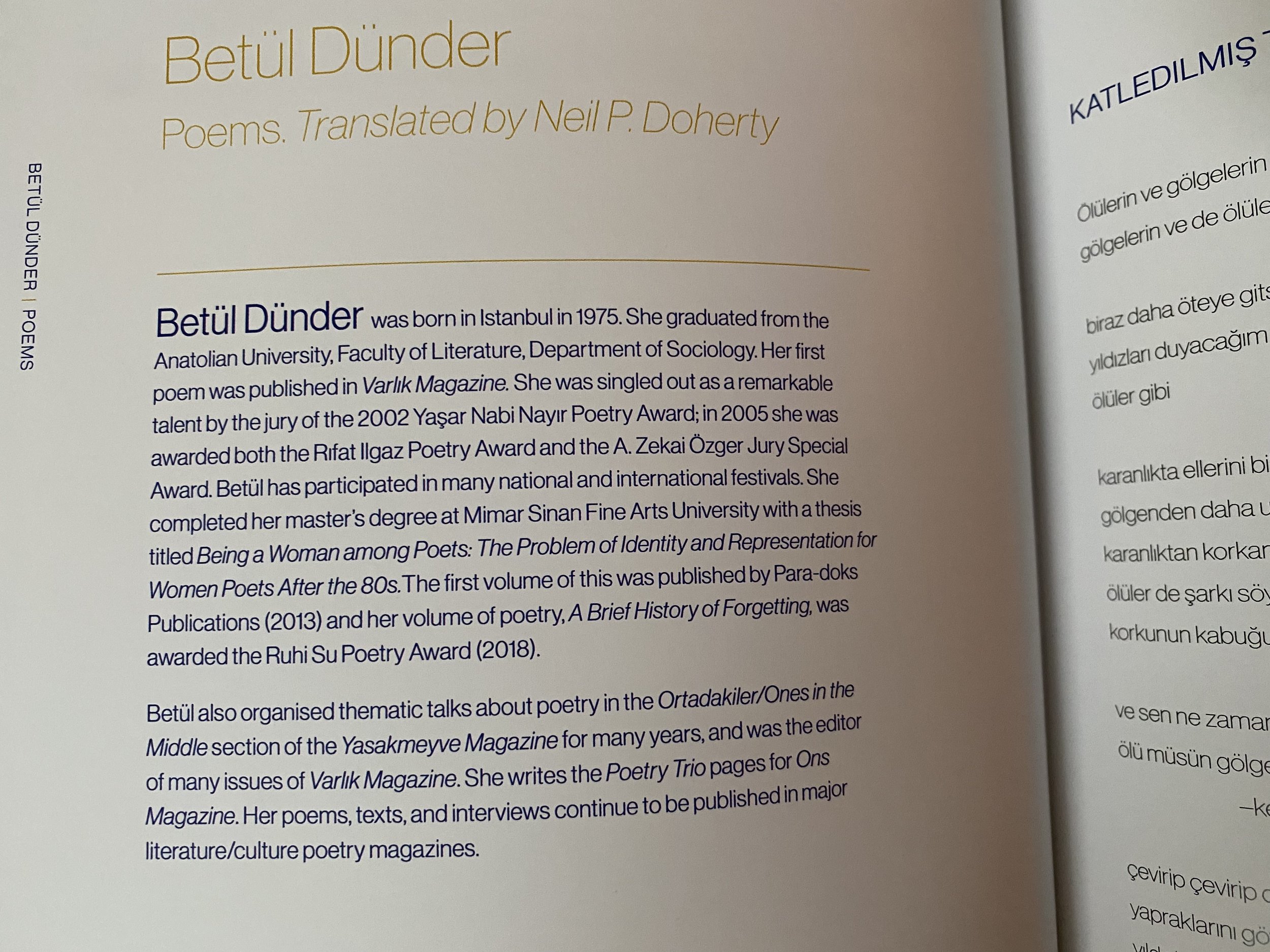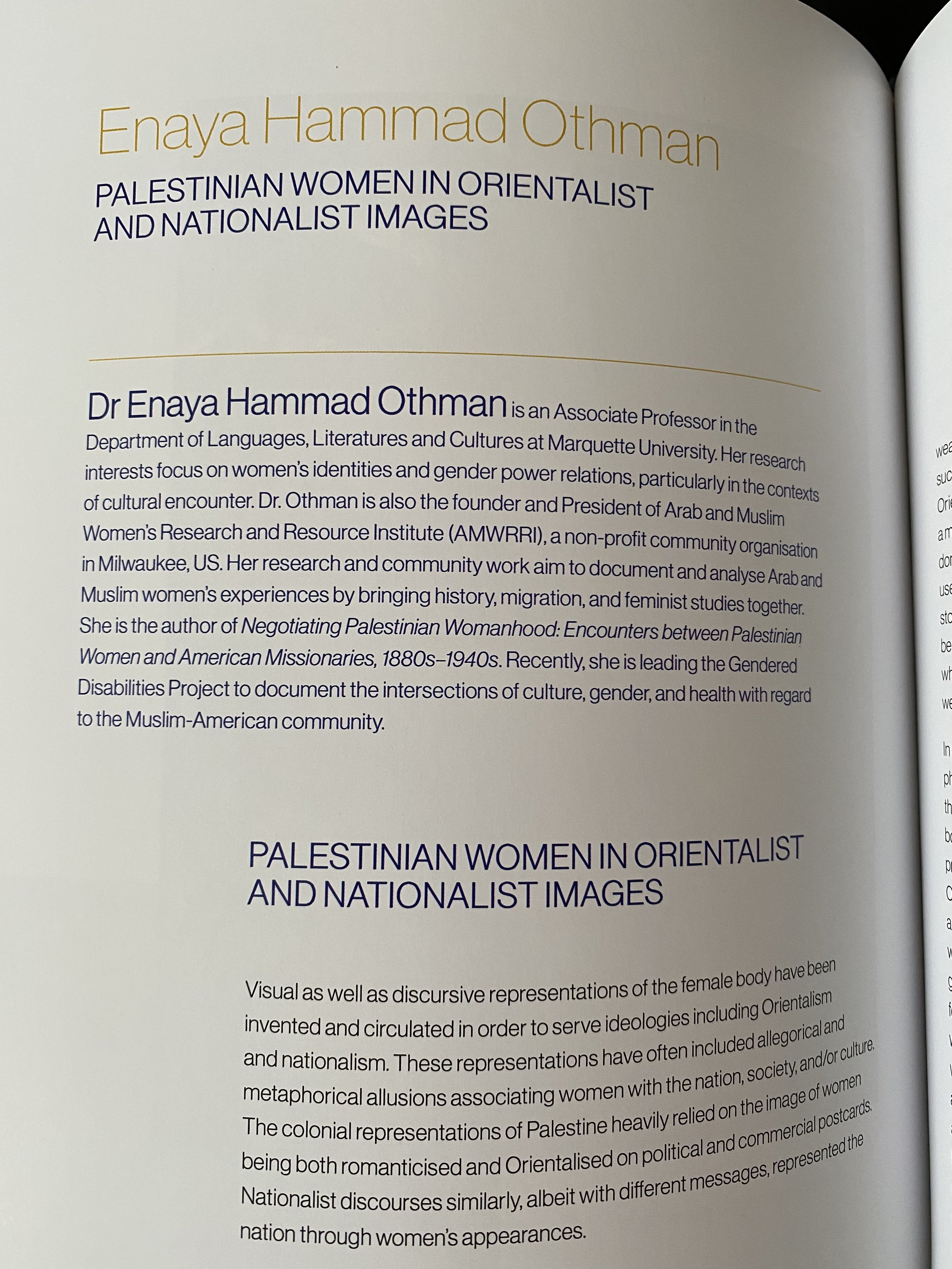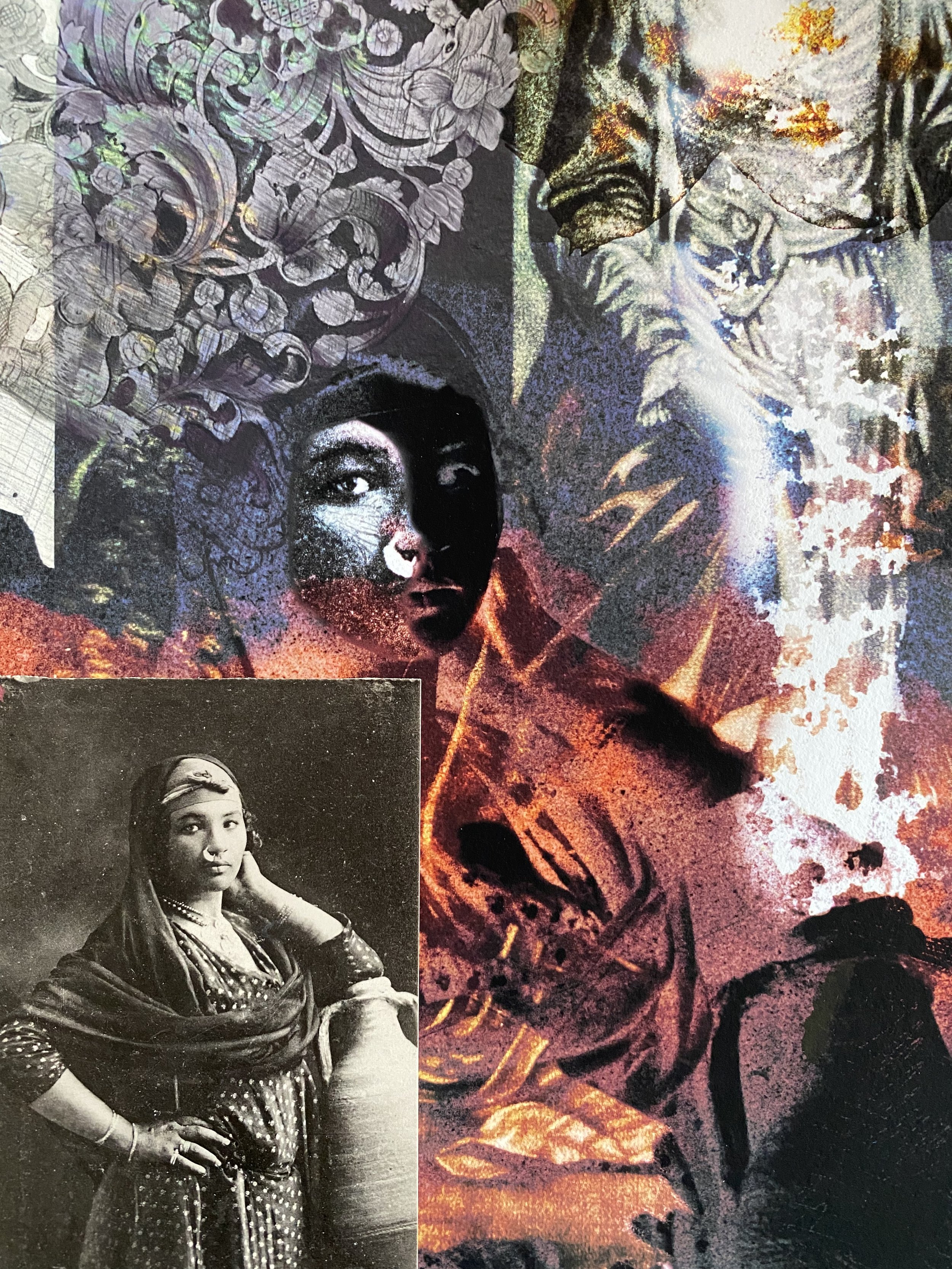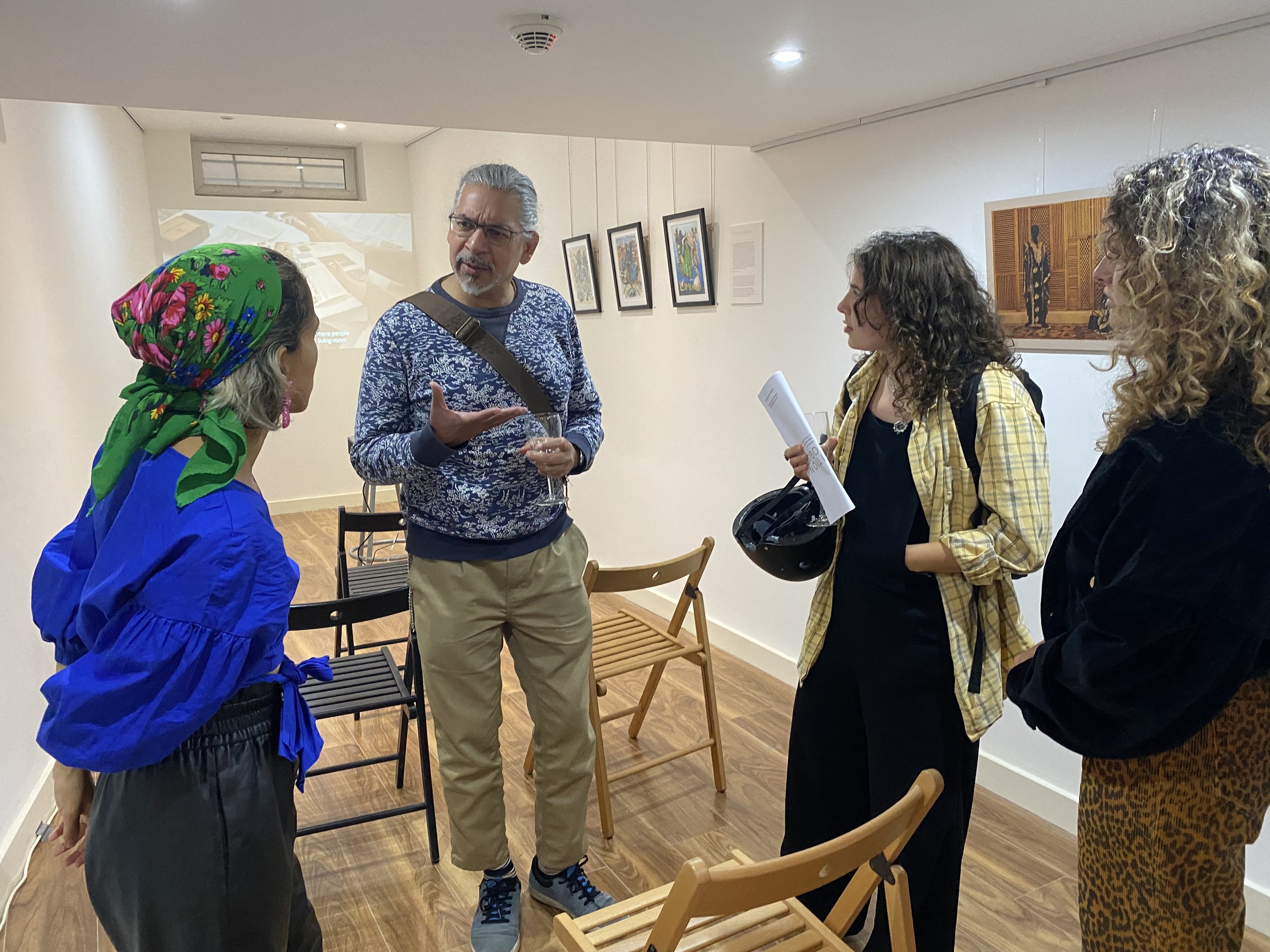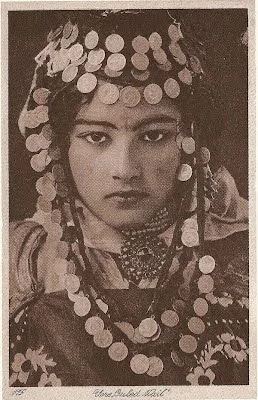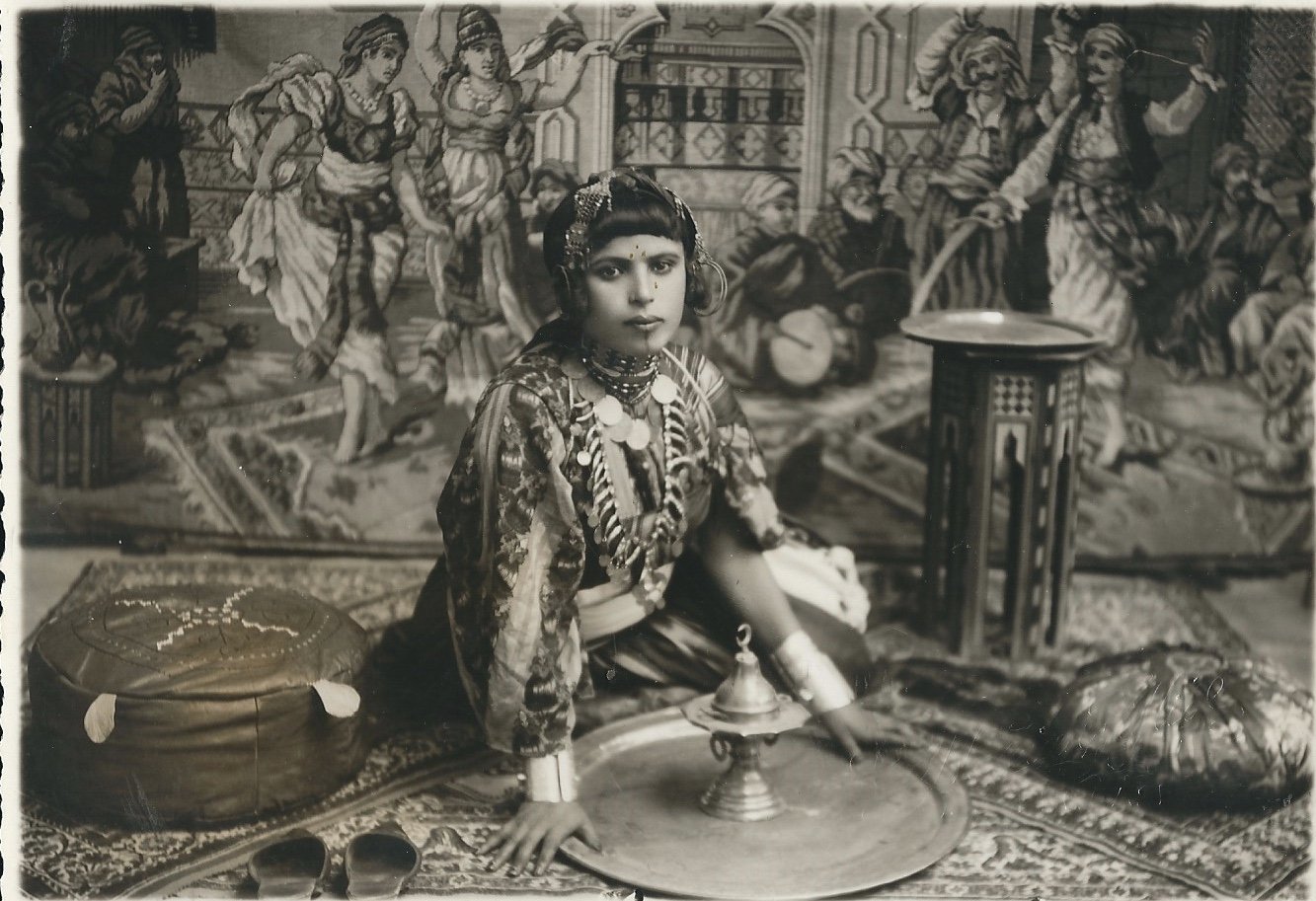The Imaginarium was created by artist and art historian Salma Ahmad Caller in 2018 as a place for the artists, academics, writers and researchers to personally engage with the postcard women and their potential ways of being, and to meditate upon different histories and geographies, to become intercessors on behalf of the Postcard Women, rewriting histories and incorporating new perspectives and visions and reclaiming cultural riches and richness. Today the Imaginarium postcard project has over 300 members online, mainly women artists, academics, and thinkers from the MENA region and beyond, who have all contributed greatly to the project with their knowledge, expertise and passion and to whom we are all indebted.
Phase II of the Imaginarium project is funded by Arts Council England, and our supporting partners are Peculiarity Press, The Mixed Museum, The Arab British Centre and The Zay Initiative.
Making The Postcard Women’s Imaginarium forum
Making The Postcard Women’s Imaginarium ~ dreaming our futures out of our past - our publication curated and edited by Salma Ahmad Caller and published by Peculiarity Press - is a stunning visual compilation of art, photography, collage and essays. It is now available to order: https://www.peculiaritypress.com £25 limited run !!
About the Contributors:
Our Imaginarium member contributors are six artist researchers ~ Salma Ahmad Caller, Afsoon, Alia Derouiche Cherif, Hamida Zourgui, CritTeam (Eugenia Lopez Reus & Miguel Jaime) and Hala Ghellali. Each contribute a beautiful and thought provoking chapter discussing their art practices, and how and why they have engaged with the Imaginarium postcard project. Each artist comes to this from a unique perspective and focuses on a different aspect of personal identity and connection to postcards from a particular country of the MENA region.
In Palimpsests: Presences of Others, Salma Ahmad Caller focuses on her mixed Egyptian British heritage, drawing on her own collection of postcards and invoking the presences of multiple others in her own history and the histories of a multi-ethnic Egypt, sharing images of her photographic work using projection, assemblage and collage to disrupt the gaze and overlay the postcard women with other depths and possibilities of being.
Afsoon, an Iranian British artist with a considerable private collection of postcards of North African women collected during her many visits to French flea markets. Somewhere Between Here and Home tells us about her creative journey taking her postcard women home, sending versions of them out to the world that ask ‘are we there yet?’ and reuniting them with aspects of their cultural heritage by nestling them within elements of North African patterns, henna, jewellery and beads. Reassigning to their images an individuality and an alternative status to that given to them by the colonial postcard.
Hamida Zourgui is an Algerian artist born in France, who is now living in the UK. Her essay Homo Arabicus reveals to us the many facets of the ‘Algerian woman’ that have been eroded by the colonial postcard, and how her art practice hopes to continue the inspiring trend of other contemporary Algerian artists, filmmakers and photographers who are reclaiming the narrative. Her photographic collage works and 3D works with red thread entangle both the viewers gaze and the colonial narrative within a rich reality of experiences, traditions and poetic ritual reframed for her own time.
Alia Derouiche Cherif is a Tunisian artist who was born and grew up in the city of Tunis. In Beb el Saada: Door of Joy, Alia shares with us her tender and richly layered painting and collage works created in response to postcard images of women from the deeply misunderstood Ouled Nail tribes. Reframing our notions of these women as ‘prostitutes’, a notion created by colonial ethno-pornographic portraits and exploitative measures by the French army in Tunisia that continue to this day to work to demean and misrepresent these people and their way of life, Alia overlays the images with the complex layers of the patterns of Tunisian culture, multi-ethnic histories and experiences, and contemporary glimpses of being a Tunisian woman. Alia has strikingly replaced the face of an Ouled Nail woman on a postcard by Lehnert & Landrock with the beautiful face of Meriem Naili, a contemporary woman of Ouled Nail ancestry linking her to these same women of the past and to a heritage that remains a taboo subject even today.
Hala Ghellali is a Libyan jewellery historian, researcher and artist, who now lives in the US. Colonial postcards from Libya: Reclaiming the Songs of our Heritage is an homage to Libyan women and Libyan dress and adornment. Her deep blue cyanotypes of photographs taken by Italian studios during the colonisation of Libya convey both the sorrows held within these kinds of images, but also suggest the hidden depths that have been obscured. Glints of gold draw the eye to heritage jewellery pieces which her essay tells us were rich with songs of the bougala, and poetic and cultural meanings, handed down over generations like some of the pieces from her mother and grandmother in her own collection. Her book Jewelry and Adornment of Libya is being published by BLKVLD later this year.
CritTeam ~ Eugenia López Reus & Miguel Jaime, are an Art & Research duo from Spain that emerged in the UAE in 2013 whilst they were lecturing there, on Islamic ornament, art, design and architecture. Exploring colonialism, Orientalism, Otherness, patriarchy and identity in Spain, Fighting Myths reveals their extraordinary artistic journeys and the importance of the creative process, while they were making their three art and research projects as responses to their own collection of Orientalist postcards of women and old colonial photographs found at the Barcelona Flea Market. Critiquing the Modernist Blue Nudes of Matisse by collaging postcards of North African women within the frame of his nude, using Islamic Nasrid tessellated ornament designs of Alhambra to cut up Lehnert & Landrock exploitative nude portraits of young Tunisian women, they finally explore their own poignant family histories and things connecting them to the Spanish colonial war in Morocco in the 1920s, the Rif war, through a very special series of postcards from Morocco that they found at the Barcelona flea market sent by a Spanish solider in that war to his dear daughter.
From Imaginarium phase I we are delighted to share Stephanie Nic Cárthaigh’s fascinating essay Pinning Down Types, Mounting Butterflies: Postcards, Women, and Typologies that draws on her own Irish experience of colonisation, and intricate identity entanglements with France and Tunisia, delving into the personal and political, language and the creation of colonial categories. Her essay arranged in the form of a butterfly in flight was created and designed for our exhibition by Christian David Caller.
Two stunning and devastating poems, Some Women Leave No Shade ~ for all the slaughtered women and Beyrut by established Turkish poet Betül Dünder translated superbly by Neil Patrick Doherty were written especially for our first exhibition at Willesden Gallery London in 2019.
In this volume we are very honoured to be joined by four guest contributors who share our aims and concerns and who join forces with us here to share their profoundly important perspectives:
Ariella Aïsha Azoulay is an Algerian Jewish voice we must listen to, she is professor of Modern Culture and Media and Comparative Literature at Brown University, a film essayist and curator of archives and exhibitions. In her contribution Dear Mme Cohen, If only they had asked you why you kept these photographs with you she shares with us an extract from her upcoming book Algerian Letters - the Jewelers of the Oumma. This letter has been addressed to Mme Cohen who may actually be a family member or relative. This poignant and revealing letter essay addressed to Mme Cohen critically draws out the ways in which Algerian Jewish women’s individuality, dress, and ways of life have been erased in favour of a narrative of European progress, through the modes of representation in photographs and postcards and in the minimal and disinterested way museums keep records.
Dr Enaya Hammad Othman is Associate Professor in the Department of Languages, Literatures and Cultures at Marquette University, and in her text Palestinian Women in Orientalist and Nationalist Images she discusses the representation of a young woman in traditional dress from Bethlehem on a colonial postcard in relation to the painting of a woman wearing the Palestinian thob, by Palestinian artist Imad Abu Shtayyah, and the entangled issues and narratives of representation, colonialism, Orientalism, missionary activity, identity, nationalism and Palestinian women’s mechanisms of activism, resistance and agency through the changing landscape of their cultural dress.
Dr Reem El Mutwalli, an author, curator, public speaker and consultant on Islamic art, architecture, interior design, historic dress and UAE heritage, arrived in what is now the UAE from Iraq in 1968 when she was about five years old. In her contribution Trilogy: One Gown, Three Generations & Collecting narratives of ‘Arab Dress’ she shares with us a beautiful series of portraits, Trilogy, of herself, her daughter Mae Noaf and her mother wearing the Iraqi gown called the Hashmi. She tells us of her journeys, of the complexities of having mixed cultural identity, and on founding the Zay Initiative and becoming a collector of Arab dress, adornments, and their histories as well as their living narratives, setting up databases where accurate information and vital stories of heritage can be found. Her way to take back control of how Arab dress is seen and understood in a rapidly changing world.
Dr Stephen Putnam Hughes and Dr Emily Stevenson’s essay Dramatic Moments in the Lives of Indian Postcard Women compare a series of related colonial era postcards of Indian women to ‘better recognise the role of the women in the performance of the “photographic event” and ‘to highlight that these women were involved in complex performative acts rather than just being objects of representation’. Both Stephen and Emily have been engaged with collecting postcards of colonial India for some time, and some of these can be seen on their well known Instagram platform Picture Postcard Empire. Stephen’s academic research focuses on early 20th-century history of media in Tamil-speaking south India and he is currently Film Officer and Film Festival Director at the Royal Anthropological Institute in London and Emily is a visual and historical anthropologist with a focus on south India who is currently a Leverhulme Early Career Research Fellow at the Pitt Rivers Museum, University of Oxford.
Anastasia Kashian
‘I am an an artist with a particular interest both in narrative and in the many ways in which visual materials may be ‘read’. I have a degree in Anthropology from University College London (the home of the 1930s Eugenics movement – Fun Fact!) where I spent most of my time hiding in the Folklore Society Library (recommended) and the Petrie Museum – I am permanently intrigued by the concept, and the aesthetics, of museums, the theft and repurposing of artefacts, of whole civilisations sealed up in glass-fronted cases like butterflies, and the place of the Museum in formulating and presenting a Victorian hierarchical model of world order that is still entrenched in the Western cultural mind today. (And I also once lived with a very famous art thief...). Currently I am very focused on the visual symbolic language of the Tarot, particularly the Tarot de Marseille, and the way visual imagery can be used to transmit codified information, from the justifiably cautious Humanist networks of the European Renaissance to the conspiratorial occultism that has such a hold on the modern imagination. The modern Tarot deck has a long and complicated association with the themes of cultural appropriation and Western Orientalism. The card titled ‘L’Empire’ is one of a projected three pieces reimagining the Postcard Women as Tarot Cards.’
Born Cheltenham 1969
Making The Postcard Women’s Imaginarium: dreaming our futures out of our past Peculiarity Press Curated and Edited by Salma Ahmad Caller
EXHIBITION PRIVATE VIEW THURSDAY 22nd SEPTEMBER 2022 6PM - 8PM CAMDEN IMAGE GALLERY LONDON - EVERYONE WELCOME
About Making The Postcard Women’s Imaginarium
‘Any of these women captured on colonial postcards could have been my ancestors. I see the imposition of the colonial photographer that both alienates and seduces me. Looking at them, I ask in dismay - “where did my great-grandmother disappear to?” What may sound like a personal question, is actually a shared experience informed by an anti-colonial refusal to let our ancestors disappear into their “moderneotype” descendants (our mothers or grandmothers), and see ourselves inheritors only of this no-less-fabricated-type – “modern.” No wonder it is difficult to recognise ourselves in either the colonialeotype or moderneotype. Reversing the imperial temporality of colonial postcards, an opening is made for the replacement of alienation with reclamation, and assimilation with repair’ Ariella Aïsha Azoulay
The above is a statement that has been written especially for Imaginarium phase II by Ariella Aïsha Azoulay, who is of Algerian Jewish descent, a theorist of photography and visual culture, curator, professor, and author of several vital texts including Potential History: Unlearning Imperialism. Ariella explained to me that she coined the term moderneotype on the spot - to emphasise that in the afterlife of colonisation, what was and still is promoted as ‘modern’ is also a type - when drafting these lines for the Postcard Women. How our mothers and grandmothers have been designed as ‘types’ in an ‘old world’ and who were then compelled to be ‘modern’ or else be conceived as backward.
Ariella has encapsulated the intentions of our project called Making The Postcard Women’s Imaginarium project, that began in 2018, to reverse the temporality of the colonial postcard. For those of us working passionately to reclaim the narrative, we ARE the Postcard Women. We bring them out of the past into the present and hope to take them into the future as part of our lives, and part of our lineages, narratives and histories. We are women (and some men) living across the so-called East and West, with mothers, grandmothers or great-grandmothers from the MENA region or with deep conceptual, personal and creative ties to the region. We aim to take the Postcard Women out of the static colonial space-time and make them ours again, our women, our stories and our bodies. Women around the world are still subject to violence in all it’s forms. Colonial wars and cross- cultural meetings across borders have defined who we are. We stand against this violence and believe in creating meaningful futures for women, and in bringing to life the lineages and knowledge of our maternal ancestors, drawing on our cultural stories as foundations for finding new ways of being in the world.
The Postcard Women’s bodies are ‘captured’ frozen in an unchanging mediated medium where they have been abused, misrepresented, mislabelled and objectified. The violence of the gaze underlies every image. Their bodies shown having to hold positions they would never have held, clutching water vessels or other cultural objects cast as Orientalist and colonial ‘props’, and forced to gaze provocatively or mysteriously, or be shown naked and stripped of their privacy. Their body adornments - jewellery, textiles, patterns, body markings - were used to display the women as ‘exotic’ ‘erotic’ ‘primitive’ and ‘tribal’ without contextualisation or understanding, brutishly framed to serve European colonial aspirations. These water vessels, jewels and clothes all carry deeply within them cultural histories of women, specific knowledges and ways of being that would have been handed down to each woman from her female ancestors. Vessels of identity and selfhood.
And yet this is an important archival resource we must continue to interrogate. A vital visual record of times past. A problematic document but a document all the same, of the multicultural multi-ethnic cultural heritage and identities of the MENA region that should remind us of how we have more in common than not, and that borders drawn in recent times were once porous and fluid, and that cultures were entangled and entwined and carried over the land by movements of peoples as they are today.
Below you can see some of the extraordinary artistic responses by the six Imaginarium artists who are part of Phase II:
Salma Ahmad Caller - Instagram @salmacaller / salmaahmadcaller.com
Afsoon - https://afsoon.co.uk
CritTeam (Eugenia López Reus & Miguel Jaime) - https://www.critteamart.com
Hamida Zourgui - Instagram @homoarabicus
Alia Derouiche Cherif - Instagram @aliaderouichecherifpro
Halal Ghellali - Instagram @lamemoirequiflanche
Guest contributors - Ariella Aïsha Azoulay , Dr Reem El Mutwalli of the Zay Initiative and Stephanie Nic Cárthaigh
Phase II Imaginarium and events have been funded by Arts Council England
Supporting partners:
OUR IMAGINARIUM BOOK IS BEING PUBLISHED BY PECULIARITY PRESS RELEASE DATE 22ND SEPTEMBER 2022 SEE DETAILS BELOW
Making The Postcard Women’s Imaginarium : dreaming our futures out of our past curated and edited by Salma Ahmad Caller and published by Peculiarity press
Imaginarium and The Mixed Museum collaboration:
Out of the East into the West - online exhibition now live !! A collaboration between The Mixed Museum and Imaginarium Postcard Project
https://mixedmuseum.org.uk/out-of-the-east-into-the-west/
A first of its kind collaboration and online exhibition with the award winning The Mixed Museum - Dr Chamion Caballero director of The Mixed Museum and Salma Ahmad Caller founder of the Imaginarium Postcard project this exhibition explores what it means to be Arab/North African and British, and explores mixed Arab British histories.
Examining images and romantic book covers of the early 20th century that made mixed marriages of white women with Arab men look exotic, dangerous and erotic, and comparing these with how women of the Middle East and North Africa were portrayed on postcards and images of the time, the online exhibition will then be showing the the realities of being mixed through the lens of Salma’s own mixed English Egyptian family story and archival newspaper stories of mixed marriages between white working class English women and Arab men in the early 20th century/late 19th century. The harsh realities of dealing with racial stereotyping and prejudice as mixed couples and the realities of a mundane normal existence building a life just like everyone else will be set up against this backdrop of fantasy and exoticism of Arab/North African men and women.
Looking to unpick the historical stereotypes of such Arab British mixing, Salma’s own story and the work being created by Imaginarium artists Afsoon, Alia Derouiche Cherif, Hamida Zourgui, Hala Ghellali and CritTeam (Eugenia López Reus & Miguel Jaime) around colonial postcards of the late 1800s and early 1900s regarding heritage and dress of the MENA region will throw light on the depths and complex meanings of these ways of being and give viewers a more in-depth understanding of MENA women’s cultural heritage beyond the exotic and simplistic stereotypes.
Imaginarium Events September / October 2022
Things That Matter - Bring and Tell workshop at The Arab British Centre September 15th 6.30pm- 8.30pm
An exciting in-person workshop - Salma Ahmad Caller, Afsoon and Hamida Zourgui together with Becky Harrison&Amani Hassan of The Arab British Centre will be hosting a warm and delightful evening bringing in family photographs, colonial postcards of women, and heritage possessions and jewellery to generate discussions about Arab and North African women’s dress and identity and being Arab/North African and British. Participants and audience will be invited to bring in images and belongings to discuss and share family heritage and stories in a friendly atmosphere with nibbles !
Two exciting webinars hosted by The Zay Initiative on 20th September 2022 & October 11th 2022
Register here:
1- Sit Down and Make Yourself Uncomfortable - Meet The Postcard Women !! With Salma Ahmad Caller, Afsoon, CritTeam (Eugenia Lopez Reus & Miguel Jamie), Hamida Zourgui, Hala Ghellali, Alia Derouiche Cherif in conversation with Dr Reem El Mutwalli on Wednesday 20th September 12pm NYC, 5pm London, 8pm Dubai
https://thezay.org/event/meet-the-postcard-women/
2- Unruly Jewels - Neither Muslim nor Jewish - with Ariella Aisha Azoulay / Salma Ahmad Caller in conversation with Dr Reem El Mutwalli on Tuesday 11th October 12pm NYC, 5pm London, 8pm Dubai
https://thezay.org/event/unruly-jewels-neither-muslim-nor-jewish/
Further reading about the Imaginarium Postcard Project on the Zay blog platform:
Hollow Gold Beads by Salma Ahmad Caller: https://thezay.org/imaginarium-postcard-women-part-1/
Invisible Languages by Salma Ahmad Caller: https://thezay.org/invisible-languages/
An Interview with Salma Ahmad Caller https://thezay.org/salma-ahmad-caller/
Imaginarium members and book contributor biographies:
Salma Ahmad Caller was born in Iraq to an Egyptian father and a British mother and grew up in Nigeria and Saudi Arabia. She now lives in the UK. An artist, art historian and writer, Salma considers herself a disruptive body, a hybrid of cultures and faiths. Her work explores her mixed- race identity, cross-cultural experiences, text/image relationships and forms of embodiment, materiality and memory, drawing on personal intimate family histories and vulnerability as a way to destabilise larger narratives. Uncanny juxtapositions and hybrid forms are used to investigate how the private and political collide and intertwine, using techniques of collage, assemblage, drawing, watercolour, photography, projection, installation/sound and more recently film. Salma also writes art theory, poetry and creative non-fiction. Her theoretical background in research on the meanings of ornament in non-Western cultures through frameworks of anthropology of art and cognitive science/physiology, are used to decolonise and break down boundaries, categories, typologies and terminology that characterise hegemonic colonial and patriarchal formations. With a Masters in art history and art theory, and a background in medicine and pharmacology, and several years teaching cross-cultural ways of seeing via non-Western artefacts at Pitt Rivers Museum in Oxford, she now works as an independent artist and teacher.
Afsoon is an Iranian born, London based artist. She works predominantly in collage but has used various media such as linocut, watercolour, photography, ceramic, pastel and etching. She usually spends long periods researching her chosen subject to make pieces that often combine text with images while merging Occident and Orient ideas. Her work is humorous, playful and sophisticated and feels simultaneously familiar and foreign. Afsoon has taken part in numerous solo and group shows, biennales and museum exhibitions. Her pieces can be found in prominent collections such as the British Museum, LACMA (Los Angeles County Museum), and the Berger/YSL Collection.
Hamida Zourgui is a French-Algerian mixed media artist based in London. After completing her MA in Art history and Sociology she worked in museums and art spaces as a mediator and freelance art journalist. Growing up in France with an Algerian background has always played a major role in the construction of her identity, which then became the core and heart of her artistic expression. Hamida’s mixed media artwork focuses on the creation of bridges between her two cultures. Dual citizenship is echoed in the duality of references, and in the inspiration behind her themes and preoccupations. For Hamida her work is crucially an homage to colonised women and colonised bodies. Orientalism is a word anchored in her research, as it is often the only lens employed to represent and misrepresent Algerian women in art and imagery. Her digital and analogue photographs are incorporated and transformed within collage works. These Arabic pop-art inspired transformations aim to narrate a new Algerian woman, giving ‘her’ a renewed potent visual presence. Nostalgia, womanhood, and colonisation are three themes to constantly grapple with and reconcile with present realities of Algerian women. As part of the Muslim female artists collective Variant Space, Hamida has shown her work in London at The Foundry in June 2018 and in September 2018 in New York . Her talks were an important feature of the Pop Art from North Africa Collective exhibition at the P21 Gallery in London in 2017.
Alia Derouiche Cherif is a visual artist who was born and grew up in Tunis. In 1991 Alia obtained her MA in interior design, in 1997 her doctorate in science techniques in the Arts at the University ITAAUT. She has been teaching fashion design for over 20 years and has participated in various significant group exhibitions in Tunisia - Bardo museum, Alain Nadaud Gallery, Musk and Amber Gallery, Elbirou Art Gallery, Effesto gallery, Le Cap gallery, City of Culture of Tunisia. Alia’s solo exhibitions took place at the Musk and Amber Gallery Tunisia in September 2018 & 2019 and October 2021. Her rich work collages together many layers of Tunisian cultural heritage both past and contemporary, and her painting fiercely reclaims ornamental techniques from Orientalist painting by asserting the complex meanings and cultural contexts of Islamic and multi-ethnic Tunisian patterns and calligraphic forms.
CritTeam (Eugenia López Reus and Miguel Jaime) is an Art & Research duo that emerged in the UAE in 2013. Their work explores intersections of art, architecture and culture, questioning common notions of tradition, ornament, and identity. CritTeam’s work is rooted in both digital and traditional media such as photography, photographic collage and drawing, which they expand to include theoretical writings, video, installations, and design proposals. Their practice explores post Avant -garde discourses of colonialism, Orientalism, Modernism, and non-Western ornamental art. They both hold PhDs in architectural design and have been educators and researchers at universities in Europe, America and the Middle East. Their work has been published and exhibited at various European and Middle Eastern institutions such as the Sharjah Art Foundation (2016 & 2017), the University of Edinburgh (2017), The XIV Spanish Biennial of Architecture and Urbanism (Santander 2018), The 8th Biennial of Contemporary Textile Art WTA at Museum of Garment and Ethnologic Heritage Research Centre (Madrid 2019), ‘The Best Design of the Year’ at Barcelona Design Museum DHUB (2021), among others. CritTeam has been nominated for the Art FAD Awards 2021 for Best Artistic Creation by FAD’s Artists and Artisans Association. Since 2018 CritTeam has been based in Barcelona.
Hala Ghellali was born and grew up in Tripoli, Libya. She lived in France where she completed her undergraduate and postgraduate studies in Comparative Literature. After several years of teaching at the University of Tripoli, she lived in Italy, Egypt and Syria before settling in the USA. She is particularly interested in Libyan history, cultural heritage, vernacular poetry and the contemporary art scene. Hala’s family ancestral connection to the art of weaving and traditional clothes has been a source of inspiration for her own research and work. Passionate about Libyan adornment and jewellery making, she has extensively researched its history, meanings and ties to neighbouring countries. Her research and writing also embrace photography with a focus on Orientalist photographs and postcards made in local studios during the period of Italian colonisation of Libya and she has co-curated an exhibition on the theme of jewellery in Orientalist photography and related postcards. Hala’s book on Libyan adornment and jewellery, the outcome of years of intensive research will soon be published by ?
Ariella Aïsha Azoulay, professor of Modern Culture and Media and Comparative Literature (Brown University), film essayist and curator of archives and exhibitions. Her books include: Potential History – Unlearning Imperialism (Verso, 2019), Civil Imagination: The Political Ontology of Photography (Verso, 2012), The Civil Contract of Photography (Zone Books, 2008). Among her films: Un-documented: Unlearning Imperial Plunder (2019), Civil Alliances, Palestine, 47-48 (2012). Among her exhibitions Errata (Fundació Tàpies, 2019, HKW, Berlin, 2020), and Enough! The Natural Violence of New World Order, (F/Stop photography festival, Leipzig, 2016).
Dr. Reem Tariq El Mutwalli is a published author, lead curator and public speaker. With over 30 years of experience, she is an expert consultant in Islamic art and architecture, interior design, historic dress and UAE heritage. She is also the founder of the Zay Initiative. A non-profit UK registered initiative advancing the preservation of cultural heritage, through the collection, documentation and digital archiving of Arab historical attire and their stories whose goal is to empower and sustain global cross-cultural dialogue to inspire creative minds.
Stephanie Nic Cárthaigh was born in Canada to a German mother and an Irish father. She returned to Ireland in 1987, living in Cork and Killarney. Following a B.A. in French and Philosophy at University College Cork, she emigrated to France in 1999, bringing her M.A. in French, also from UCC, with her, which she completed there. She taught English at various universities, and she has also been working as a translator and proofreader. She is working on a doctoral thesis on George Sand for the Paris-Sorbonne University. An active member of the Paris-based branch of Conradh na Gaeilge (the Gaelic League), An Ghaeltacht-sur-Seine (The Irish-speaking region on the Seine), since 2017, she enjoys singing, particularly in Irish, in the sean-nós tradition.
Dr Stephen Putnam Hughes is currently Film Officer and Film Festival Director at the Royal Anthropological Institute in London, UK. Previously based at SOAS, University of London, his research focuses on early 20th-century history of media in Tamil-speaking south India. His publications cover the histories of film-going and cinema exhibition, silent film, early Tamil cinema, gramophones, radio, drama and postcards.
Dr Emily Stevenson is a visual and historical anthropologist with a focus on south India. She is currently a Leverhulme Early Career Research Fellow at the Pitt Rivers Museum, University of Oxford. Her research interests include the history of photography in south India, picture postcards, material culture, heritage, and urban change.
Dr Enaya Hammad Othman is an Associate Professor in the Department of Languages, Literatures and Cultures at Marquette University. Her research interests focus on women’s identities and gender power relations, particularly in the contexts of cultural encounter. Dr. Othman is also the founder and President of Arab and Muslim Women Research and Resource Institute (AMWRRI), a non-profit community organization in Milwaukee, US. Her research and community work aim to document and analyze Arab and Muslim women’s experiences by bringing history, migration, and feminist studies together. She is the author of Negotiating Palestinian Womanhood: Encounters between Palestinian Women and American Missionaries, 1880s-1940s. Recently, she is leading Gendered Disabilities Project to document the intersections of culture, gender, and health with regard to the Muslim American community.
Neil P. Doherty is a translator born in Dublin, Ireland in 1972 who has resided in Istanbul since 1995. He holds an M. Phil in linguistics from Trinity College, Dublin and currently teaches EAP to first year students of psychology in Bilgi University. Neil is a freelance translator of both Turkish and Irish poetry. He was one of the editors of Turkish Poetry Today in 2017/18 and is currently working on a book of poems by Gonca Özmen.
Betül Dünder was born in Istanbul in 1975. She graduated from the Anatolian University, Faculty of Literature, Department of Sociology. Her first poem was published in Varlık Magazine. She was singled out as a remarkable talent by the jury of the 2002 Yaşar Nabi Nayır Poetry Award; in 2005 she was awarded both the Rıfat Ilgaz Poetry Award and the A.Zekai Özger Jury Special Award. Betül has participated in many national and international festivals. She completed her master’s degree at Mimar Sinan Fine Arts University with a thesis titled Being a Woman among Poets: The Problem of Identity and Representation for Women Poets After the 80s.The first volume of this was published by Para-doks Publications (2013) and her volume of poetry; A Brief History of Forgetting was awarded the Ruhi Su Poetry Award (2018).
Betül also organized thematic talks about poetry in the Ortadakiler/Ones in the Middle section of the Yasakmeyve Magazine for many years and was the editor of many issues of Varlık Magazine. She writes the Poetry Trio pages for Ons Magazine. Her poems, texts and interviews continue to be published in major literature/culture poetry magazines.











